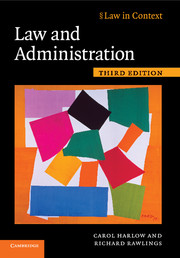Book contents
- Frontmatter
- Contents
- Preface
- Table of Cases
- Table of Statutes
- 1 Red and green light theories
- 2 The changing state
- 3 Transforming judicial review
- 4 Making the law
- 5 Rules and discretion
- 6 Regulation and governance
- 7 Regulatory design and accountability
- 8 Contractual revolution
- 9 Contract, contract, contract
- 10 Into the jungle: Complaints, grievances and disputes
- 11 Tribunals in transition
- 12 The Parliamentary Ombudsman: Firefighter or fire-watcher?
- 13 Inquiries: A costly placebo?
- 14 Continuity and change: Procedural review
- 15 Elite dimension: Court structures and process
- 16 Judicial review and administration: A tangled web
- 17 ‘Golden handshakes’: Liability and compensation
- Index
13 - Inquiries: A costly placebo?
Published online by Cambridge University Press: 05 June 2012
- Frontmatter
- Contents
- Preface
- Table of Cases
- Table of Statutes
- 1 Red and green light theories
- 2 The changing state
- 3 Transforming judicial review
- 4 Making the law
- 5 Rules and discretion
- 6 Regulation and governance
- 7 Regulatory design and accountability
- 8 Contractual revolution
- 9 Contract, contract, contract
- 10 Into the jungle: Complaints, grievances and disputes
- 11 Tribunals in transition
- 12 The Parliamentary Ombudsman: Firefighter or fire-watcher?
- 13 Inquiries: A costly placebo?
- 14 Continuity and change: Procedural review
- 15 Elite dimension: Court structures and process
- 16 Judicial review and administration: A tangled web
- 17 ‘Golden handshakes’: Liability and compensation
- Index
Summary
Chapter 10 of this book was devoted to complaints. Adopting a ‘bottom-up’ perspective, we considered the machinery for complaints-handling, its place in the administrative-justice landscape and various possible components of ‘proportionate dispute resolution’. In Chapter 11 we turned our attention to tribunals, firmly established by the Franks Committee as ‘machinery for adjudication’. We looked at their emergence as a two-tier system of administrative adjudication in terms of the Tribunals, Courts and Enforcement Act 2007. As the JUSTICE–All Souls Committee perceived, inquiries ‘though often referred to in the same breath as tribunals … have quite a different origin, purpose and status and their development has been somewhat different’. Wade too had noted their ambiguous character: they were, he thought, a hybrid legal-and-administrative process, and ‘for the very reason that they have been made to look as much as possible like a judicial proceeding, people grumble at the way in which they fall short of it’. This ambiguity is a central theme of this chapter.
The chapter looks at the genesis of inquiries as ‘machinery for investigation’, using procedures usually classified as ‘inquisitorial’. These, however, both resemble and differ from the investigatory procedures of the Parliamentary Ombudsman studied in Chapter 12. We ask how far this inquisitorial procedure differs from the common law adversarial procedures that we have come to accept as the adjudicative norm. Have inquiries followed tribunals too far down the path of judicialisation, drifting back to the adversarial procedure that common lawyers instinctively prefer?
- Type
- Chapter
- Information
- Law and Administration , pp. 570 - 615Publisher: Cambridge University PressPrint publication year: 2009



